List of Padma Bhushan award recipients (1960–1969)
The Padma Bhushan is the third-highest civilian award of the Republic of India.[1] Instituted on 2 January 1954, the award is given for "distinguished service of a high order", without distinction of race, occupation, position, or sex.[2] The recipients receive a Sanad, a certificate signed by the President of India and a circular-shaped medallion with no monetary association. The recipients are announced every year on Republic Day (26 January) and registered in The Gazette of India—a publication used for official government notices and released weekly by the Department of Publication, under the Ministry of Urban Development.[3] The conferral of the award is not considered official without its publication in the Gazette. The name of recipient, whose award have been revoked or restored, both of which require the authority of the President, is archived and they are required to surrender their medal when their name is struck from the register;[4] none of the conferments of Padma Bhushan during 1960–1969 have been revoked or restored. The recommendations are received from all the state and the union territory governments, as well as from Ministries of the Government of India, the Bharat Ratna and the Padma Vibhushan awardees, the Institutes of Excellence, the Ministers, the Chief Ministers and the Governors of State, and the Members of Parliament including private individuals.[3]
| Padma Bhushan | |
|---|---|
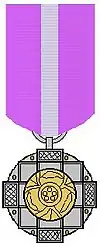 | |
| Type | National Civilian |
| Country | India |
| Presented by | Government of India |
| Ribbon | |
| Obverse | A centrally located lotus flower is embossed and the text "Padma" written in Devanagari script is placed above and the text "Bhushan" is placed below the lotus. |
| Reverse | A platinum State Emblem of India placed in the centre with the national motto of India, "Satyameva Jayate" (Truth alone triumphs) in Devanagari Script |
| Established | 1954 |
| First awarded | 1954 |
| Total | 200 |
| Website | http://www.padmaawards.gov.in/ |
| Precedence | |
| Next (higher) | |
| Next (lower) | |
When instituted in 1954, the Padma Bhushan was classified as "Dusra Varg" (Class II) under the three-tier Padma Vibhushan awards, which were preceded by the Bharat Ratna in hierarchy. On 15 January 1955, the Padma Vibhushan was reclassified into three different awards as the Padma Vibhushan, the Padma Bhushan and the Padma Shri.[3] The criteria included "distinguished service of a high order in any field including service rendered by Government servants", but excluded those working with the public sector undertakings with the exception of doctors and scientists. The 1954 statutes did not allow posthumous awards; this was subsequently modified in the January 1955 statute.[4] The design was also changed to the form that is currently in use; it portrays a circular-shaped toned bronze medallion 1 3⁄4 inches (44 mm) in diameter and 1⁄8 inch (3.2 mm) thick. The centrally placed pattern made of outer lines of a square of 1 3⁄16 inches (30 mm) side is embossed with a knob carved within each of the outer angles of the pattern. A raised circular space of diameter 1 1⁄16 inches (27 mm) is placed at the centre of the decoration. A centrally located lotus flower is embossed on the obverse side of the medal and the text "Padma" is placed above and the text "Bhushan" is placed below the lotus written in Devanagari script. The State Emblem of India is displayed in the centre of the reverse side, together with the national motto of India, "Satyameva Jayate" (Truth alone triumphs) in Devanagari script, which is inscribed on the lower edge. The rim, the edges and all embossing on either side is of standard gold with the text "Padma Bhushan" of gold gilt. The medal is suspended by a pink riband 1 1⁄4 inches (32 mm) in width with a broad white stripe in the middle.[3][4] It is ranked fifth in the order of precedence of wearing of medals and decorations of the Indian civilian and military awards.[lower-alpha 1]
A total of 200 awards were presented in the 1960s – ten in 1960, followed by thirteen in 1961, twenty-seven in 1962, twelve in 1963, eighteen in 1964, twenty-five in 1965, fourteen in 1966, twenty-four in 1967, twenty-eight in 1968, and twenty-nine in 1969. The Padma Bhushan in the 1960s was also conferred upon five foreign recipients – two from the United States and one each from Canada, Russia, and the United Kingdom. Individuals from nine different fields were awarded, which includes sixty-nine from literature and education, thirty-two from medicine, twenty-two from civil services, seventeen artists, sixteen from public affairs, fifteen from science and engineering, fourteen from social work, ten from trade and industry, and five sportspersons. Journalist Manikonda Chalapathi Rau and Kannada writer K. Shivaram Karanth returned their 1968 awards, while Sitar player Vilayat Khan refused to accept it, with him stating that "the selection committees were incompetent to judge [his] music".[6][lower-alpha 2]
Recipients
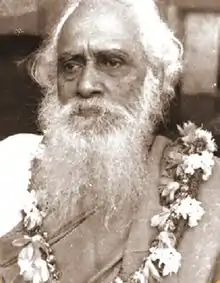
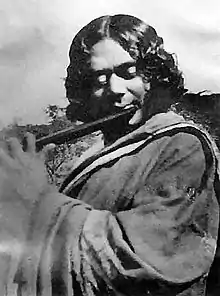
.jpg.webp)
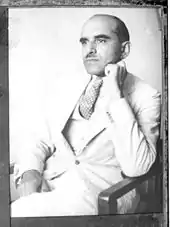
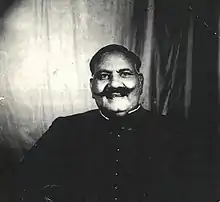
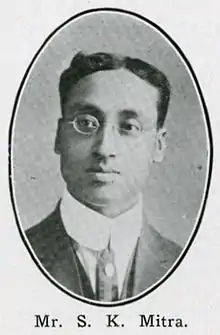
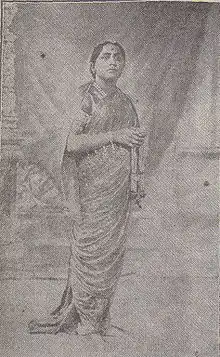
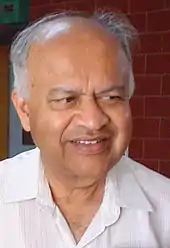
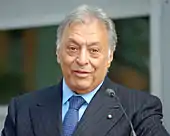
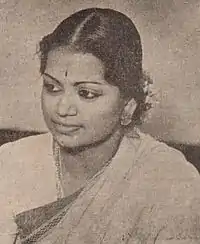
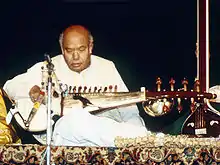
.JPG.webp)
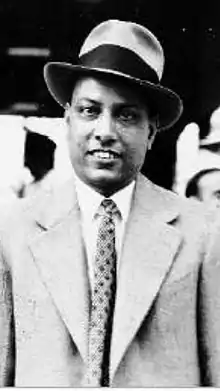
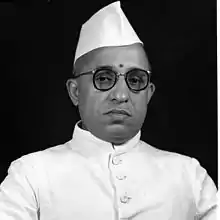
|
|
|---|
| Year | Recipient | Field | State |
|---|---|---|---|
| 1960 | Haridas Siddhanta Bagish | Literature & Education | West Bengal |
| 1960 | Rabindra Nath Chaudhuri | Medicine | West Bengal |
| 1960 | Nilakantha Das | Public Affairs | Orissa |
| 1960 | Rajeshwar Shastri Dravid | Literature & Education | Uttar Pradesh |
| 1960 | Kazi Nazrul Islam | Literature & Education | West Bengal[upper-alpha 1] |
| 1960 | Hafiz Ali Khan | Arts | Madhya Pradesh |
| 1960 | Bal Krishna Sharma Naveen | Literature & Education | Delhi |
| 1960 | Ayyadevara Kaleswara Rao | Public Affairs | Andhra Pradesh |
| 1960 | Acharya Shivpujan Sahay | Literature & Education | Bihar |
| 1960 | Vithal Nagesh Shirodkar | Medicine | Maharashtra |
| 1961 | Tridib Nath Banerjee | Medicine | West Bengal |
| 1961 | Rustomji Bomanji Billimoria | Medicine | Maharashtra |
| 1961 | Seth Govind Das | Literature & Education | Madhya Pradesh |
| 1961 | Verrier Elwin | Science & Engineering | —[upper-alpha 2] |
| 1961 | Niranjan Das Gulhati | Civil Service | Delhi |
| 1961 | L. Venkatakrishna Iyer | Civil Service | Tamil Nadu |
| 1961 | Rai Krishnadas | Literature & Education | Uttar Pradesh |
| 1961 | Sumitranandan Pant | Literature & Education | Uttar Pradesh |
| 1961 | Svetoslav Roerich | Arts | —[upper-alpha 3] |
| 1961 | Bhagwan Sahay | Civil Service | Uttar Pradesh |
| 1961 | Bindeshwari Prasad Verma | Public Affairs | Bihar |
| 1961 | K. Venkataraman | Trade & Industry | Maharashtra |
| 1961 | Ardeshir Ruttonji Wadia | Literature & Education | Maharashtra |
| 1962 | Ramaswamy Duraiswamy Ayyar | Medicine | Delhi |
| 1962 | Gyanesh Chandra Chatterjee | Literature & Education | Delhi |
| 1962 | Ramchandra Narayan Dandekar | Literature & Education | Maharashtra |
| 1962 | Prem Chandra Dhanda | Medicine | Punjab |
| 1962 | Asaf Ali Asghar Fyzee | Literature & Education | Jammu & Kashmir |
| 1962 | Bade Ghulam Ali Khan | Arts | Maharashtra |
| 1962 | Jafar Ali Khan | Literature & Education | Uttar Pradesh |
| 1962 | Daulat Singh Kothari | Civil Service | Delhi |
| 1962 | Mithan Jamshed Lam | Public Affairs | Maharashtra |
| 1962 | Sudhansu Sobhan Maitra | Medicine | West Bengal |
| 1962 | Sisir Kumar Mitra | Literature & Education | West Bengal |
| 1962 | Tarabai Modak | Social Work | Maharashtra |
| 1962 | Radhakamal Mukerjee | Science & Engineering | Uttar Pradesh |
| 1962 | Sudhindra Nath Mukerjee | Public Affairs | West Bengal |
| 1962 | Niaz Fatehpuri | Literature & Education | Uttar Pradesh |
| 1962 | Jal R. Patel | Medicine | Maharashtra |
| 1962 | Narayan Sitaram Phadke | Literature & Education | Maharashtra |
| 1962 | V. Raghavan | Literature & Education | Tamil Nadu |
| 1962 | Dukhan Ram | Medicine | Bihar |
| 1962 | T. S. Soundram | Social Work | Tamil Nadu |
| 1962 | Mahankali Seetharama Rao | Medicine | Andhra Pradesh |
| 1962 | Raghunath Saran | Medicine | Bihar |
| 1962 | Moturi Satyanarayana | Public Affairs | Tamil Nadu |
| 1962 | Sitaram Seksaria | Social Work | Assam |
| 1962 | Santosh Kumar Sen | Medicine | West Bengal |
| 1962 | Tarlok Singh | Civil Service | Punjab |
| 1962 | Raja Radhika Raman Sinha | Literature & Education | Bihar |
| 1963 | Narendra Nath Bery | Medicine | Punjab |
| 1963 | Makhanlal Chaturvedi | Literature & Education | Madhya Pradesh |
| 1963 | Omeo Kumar Das | Social Work | Assam |
| 1963 | Nitish Chandra Laharry | Social Work | West Bengal |
| 1963 | Badri Nath Prasad | Literature & Education | Uttar Pradesh |
| 1963 | Kanuri Lakshmana Rao | Civil Service | Delhi |
| 1963 | Rahul Sankrityayan | Literature & Education | Uttar Pradesh |
| 1963 | Ramanlal Gokaldas Saraiya | Public Affairs | Maharashtra |
| 1963 | T. R. Seshadri | Literature & Education | Tamil Nadu |
| 1963 | Sardar Harnarain Singh | Civil Service | Punjab |
| 1963 | M. L. Soni | Medicine | Delhi |
| 1963 | Ramkumar Verma | Literature & Education | Uttar Pradesh |
| 1964 | Sheikh Abdullah | Literature & Education | Uttar Pradesh |
| 1964 | Nuruddin Ahmed | Public Affairs | Delhi |
| 1964 | Rafiuddin Ahmed | Medicine | West Bengal |
| 1964 | Jacob Chandy | Medicine | Kerala |
| 1964 | Kunji Lal Dubey | Public Affairs | Madhya Pradesh |
| 1964 | Tushar Kanti Ghosh | Literature & Education | West Bengal |
| 1964 | Anil Bandhu Guha | Civil Service | West Bengal |
| 1964 | Mohd. Abdul Hai | Medicine | Bihar |
| 1964 | Dara Nusserwanji Khurody | Trade & Industry | Madhya Pradesh |
| 1964 | Anukul Chandra Mukherjee | Literature & Education | Uttar Pradesh |
| 1964 | Jnanendra Nath Mukherjee | Science & Engineering | West Bengal |
| 1964 | Bhola Nath Mullik | Civil Service | Delhi |
| 1964 | R. K. Narayan | Literature & Education | Karnataka |
| 1964 | Chintaman Govind Pandit | Medicine | Maharashtra |
| 1964 | Tribhuvandas Kishibhai Patel | Social Work | Gujarat |
| 1964 | N. S. Rajhans (Bal Gandharva) | Arts | Maharashtra |
| 1964 | T. Narayanayajwa Ramachandran | Science & Engineering | Tamil Nadu |
| 1964 | Khushwant Lal Wig | Medicine | Punjab |
| 1965 | Krishnaswami Balasubramania Iyer | Public Affairs | Tamil Nadu |
| 1965 | Jogesh Chandra Banerjee | Medicine | West Bengal |
| 1965 | Joginder Singh Dhillon | Civil Service | Punjab |
| 1965 | Appasaheb Patwardhan | Public Affairs | Maharashtra |
| 1965 | Bhalchandra Babaji Dikshit | Medicine | Maharashtra |
| 1965 | P. O. Dunn | Civil Service | Maharashtra |
| 1965 | Narasinh Narayan Godbole | Literature & Education | Maharashtra |
| 1965 | Nawang Gombu | Sports | West Bengal |
| 1965 | Sonam Gyatso | Sports | Sikkim |
| 1965 | Kashmir Singh Katoch | Civil Service | Punjab |
| 1965 | Akbar Ali Khan | Public Affairs | Andhra Pradesh |
| 1965 | Shantanu Lakshman Kirloskar | Trade & Industry | Maharashtra |
| 1965 | Mohan Singh Kohli | Sports | Delhi |
| 1965 | Pratap Chandra Lal | Civil Service | Punjab |
| 1965 | Mohammad Mujeeb | Literature & Education | Delhi |
| 1965 | Jayant Narlikar | Science & Engineering | Maharashtra |
| 1965 | Ramaswamy Rajaram | Civil Service | Tamil Nadu |
| 1965 | K. R. Ramanathan | Science & Engineering | Tamil Nadu |
| 1965 | Satyajit Ray | Arts | West Bengal |
| 1965 | Triguna Sen | Literature & Education | West Bengal |
| 1965 | Santu Jouharmal Shahaney | Civil Service | West Bengal |
| 1965 | Shiv Sharma | Medicine | Uttar Pradesh |
| 1965 | Harbaksh Singh | Civil Service | Delhi |
| 1965 | Vrindavan Lal Verma | Literature & Education | Uttar Pradesh |
| 1965 | Manikya Lal Verma | Social Work | Rajasthan |
| 1966 | T. S. Ramaswami Aiyer | Public Affairs | Tamil Nadu |
| 1966 | Babubhai Maneklal Chinai | Trade & Industry | Maharashtra |
| 1966 | Puliyur Krishnaswamy Duraiswami | Medicine | Delhi |
| 1966 | Verghese Kurien | Trade & Industry | Gujarat |
| 1966 | Zubin Mehta | Arts | —[upper-alpha 4] |
| 1966 | K. P. Kesava Menon | Public Affairs | Kerala |
| 1966 | Bhabani Charan Mukharji | Civil Service | West Bengal |
| 1966 | Mannathu Padmanabha Pillai | Social Work | Kerala |
| 1966 | K. Shankar Pillai | Arts | Delhi |
| 1966 | Vikram Sarabhai | Science & Engineering | Gujarat |
| 1966 | Vinayak Sitaram Sarwate | Literature & Education | Madhya Pradesh |
| 1966 | Homi Sethna | Civil Service | Maharashtra |
| 1966 | Jodh Singh | Literature & Education | Punjab |
| 1966 | Haribhau Upadhyaya | Literature & Education | Uttar Pradesh |
| 1967 | Mulk Raj Anand | Literature & Education | Maharashtra |
| 1967 | Tara Cherian | Social Work | Tamil Nadu |
| 1967 | Mulk Raj Chopra | Civil Service | Uttarakhand |
| 1967 | Tulsi Das | Medicine | Punjab |
| 1967 | Krishna Kanta Handique | Literature & Education | Assam |
| 1967 | Akshay Kumar Jain | Literature & Education | Delhi |
| 1967 | Pupul Jayakar | Social Work | Delhi |
| 1967 | Ali Akbar Khan | Arts | West Bengal |
| 1967 | D. P. Kohli | Civil Service | Punjab |
| 1967 | Ramanathan Krishnan | Sports | Tamil Nadu |
| 1967 | C. Kottieth Lakshmanan | Medicine | Tamil Nadu |
| 1967 | T. M. Ponnambalam Mahadevan | Literature & Education | Tamil Nadu |
| 1967 | Kalyanji Vithalbhai Mehta | Literature & Education | Gujarat |
| 1967 | S. I. Padmavati | Medicine | Delhi |
| 1967 | Vasantrao Bandoji Patil | Trade & Industry | Maharashtra |
| 1967 | D. C. Pavate | Literature & Education | Karnataka |
| 1967 | Datto Vaman Potdar | Literature & Education | Maharashtra |
| 1967 | B. Shiva Rao | Literature & Education | Delhi |
| 1967 | Khwaja Ghulam Saiyidain | Literature & Education | Uttar Pradesh |
| 1967 | Ashok Kumar Sarkar | Literature & Education | West Bengal |
| 1967 | Mihir Sen | Sports | West Bengal |
| 1967 | Ravi Shankar | Arts | Uttar Pradesh |
| 1967 | Kaikhushru Ruttonji Shroff | Public Affairs | Maharashtra |
| 1967 | M. L. Vasanthakumari | Arts | Andhra Pradesh |
| 1968 | Acharya Vishva Bandhu | Literature & Education | Uttar Pradesh |
| 1968 | Prabhu Lal Bhatnagar | Science & Engineering | Karnataka |
| 1968 | Sudhir Ranjan Sengupta | Literature & Education | West Bengal |
| 1968 | Mary Clubwala Jadhav | Social Work | Maharashtra |
| 1968 | K. Shivaram Karanth[lower-alpha 3] | Literature & Education | Karnataka |
| 1968 | Bismillah Khan | Arts | Uttar Pradesh |
| 1968 | Vishnu Sakharam Khandekar | Literature & Education | Maharashtra |
| 1968 | Sam Manekshaw | Civil Service | Maharashtra |
| 1968 | Mansukhlal Atmaram Master | Public Affairs | Maharashtra |
| 1968 | M. G. K. Menon | Medicine | Delhi |
| 1968 | Waman Bapuji Metre | Science & Engineering | Maharashtra |
| 1968 | Gujarmal Modi | Trade & Industry | Uttar Pradesh |
| 1968 | Murugappa Channaveerappa Modi | Medicine | Karnataka |
| 1968 | Gopalan Narasimhan | Literature & Education | Tamil Nadu |
| 1968 | Benjamin Peary Pal | Science & Engineering | Punjab |
| 1968 | Brahm Prakash | Science & Engineering | Punjab |
| 1968 | Manikonda Chalapathi Rau[lower-alpha 4] | Literature & Education | Andhra Pradesh |
| 1968 | C. R. Rao | Science & Engineering | Delhi[upper-alpha 5] |
| 1968 | Radhanath Rath | Literature & Education | Odisha |
| 1968 | Jyotish Chandra Ray | Medicine | West Bengal |
| 1968 | Mariadas Ruthnaswamy | Literature & Education | Tamil Nadu |
| 1968 | Raghupati Sahay | Literature & Education | Uttar Pradesh |
| 1968 | Shripad Damodar Satwalekar | Literature & Education | Maharashtra |
| 1968 | G. Sankara Kurup | Literature & Education | Kerala |
| 1968 | Periyasaamy Thooran | Literature & Education | Tamil Nadu |
| 1968 | Sarda Prasad Varma | Civil Service | Bihar |
| 1968 | Shamaprasad Rupshanker Vasavada | Social Work | Gujarat |
| 1968 | Mamidipudi Venkatarangayya | Literature & Education | Andhra Pradesh |
| 1969 | Tarasankar Bandyopadhyay | Literature & Education | West Bengal |
| 1969 | Krishna Chandar | Literature & Education | Maharashtra |
| 1969 | Rahim-ud-in Khan Dagar | Arts | Delhi |
| 1969 | Mohanlal Lallubhai Dantwala | Science & Engineering | Maharashtra |
| 1969 | Keshavrao Krishnarao Datey | Medicine | Maharashtra |
| 1969 | Keshav Prasad Goenka | Trade & Industry | West Bengal |
| 1969 | Semmangudi Srinivasa Iyer | Arts | Tamil Nadu |
| 1969 | Vithalbhai Jhaveri | Literature & Education | Maharashtra |
| 1969 | Prithviraj Kapoor | Arts | Punjab |
| 1969 | Kesarbai Kerkar | Arts | Maharashtra |
| 1969 | Krishna Ramchand Kriplani | Literature & Education | Delhi |
| 1969 | Adinath Lahiri | Science & Engineering | West Bengal |
| 1969 | Gobind Behari Lal | Literature & Education | —[upper-alpha 6] |
| 1969 | Kasturbhai Lalbhai | Trade & Industry | Gujarat |
| 1969 | Lata Mangeshkar | Arts | Maharashtra |
| 1969 | V. K. Narayana Menon | Science & Engineering | Kerala |
| 1969 | Raman Madhavan Nair | Literature & Education | Chandigarh |
| 1969 | Samad Yar Khan Saghar Nizami | Literature & Education | Uttar Pradesh |
| 1969 | Nanasaheb Parulekar | Literature & Education | Maharashtra |
| 1969 | Yashwant Dinkar Pendharkar | Literature & Education | Maharashtra |
| 1969 | Vitthal Laxman Phadke | Social Work | Gujarat |
| 1969 | Raja Rao | Literature & Education | —[upper-alpha 6] |
| 1969 | Niharranjan Ray | Literature & Education | West Bengal |
| 1969 | Prafulla Kumar Sen | Medicine | Maharashtra |
| 1969 | Vallabhadas Vithaldas Shah | Medicine | Maharashtra |
| 1969 | Haroon Khan Sherwani | Literature & Education | Andhra Pradesh |
| 1969 | Kasturiswami Sreenivasan | Trade & Industry | Tamil Nadu |
| 1969 | Naval Tata | Social Work | Maharashtra |
| 1969 | S. S. Vasan | Arts | Tamil Nadu |
Explanatory notes
- The order of precedence is: Bharat Ratna, Param Vir Chakra, Ashoka Chakra, Padma Vibhushan and Padma Bhushan.[5]
- Vilayat Khan had earlier refused Padma Shri (1964) and later also refused Padma Vibhushan (2000).[7]
- K. Shivaram Karanth returned the award to protest against the Emergency declared in the country in 1975.[26]
- Manikonda Chalapathi Rau returned the award.[6]
- Non-citizen recipients
References
- "PV Sindhu recommended for Padma Bhushan, India's third highest civilian award, by sports ministry". Firstpost. 25 September 2017. Archived from the original on 26 December 2017. Retrieved 26 December 2017.
- Lal, Shavax A. (1954). "The Gazette of India—Extraordinary—Part I" (PDF). The Gazette of India. The President's Secretariat (published 2 January 1954): 2. Archived from the original (PDF) on 14 May 2014. Retrieved 31 March 2018.
The President is pleased to institute an award to be designated 'Padma Vibhushan' in three classes, namely: 'Pahela Varg', 'Dusra Varg' and 'Tisra Varg'
- "Padma Awards Scheme" (PDF). Ministry of Home Affairs (India). Archived from the original (PDF) on 9 February 2018. Retrieved 28 September 2015.
- Ayyar, N. M. (1955). "The Gazette of India—Extraordinary—Part I" (PDF). The Gazette of India. The President's Secretariat (published 15 January 1955): 8. Archived (PDF) from the original on 18 May 2014. Retrieved 31 March 2018.
All persons upon whom the decoration of 'Padma Vibhushan' ('Dusra Varg') was conferred under the Regulations issued with Notification No. 2-Pres./54, dated the 2nd January, 1954, shall, for all purposes of these regulations, be deemed to be persons on whom the decoration of Padma Bhushan has been conferred by the President.
- "Wearing of Medals: Precedence Of Medals". Indian Army. Archived from the original on 3 March 2016. Retrieved 22 November 2015.
- Kumar, A. Prasanna (1983). "The Privilege of Knowing M. C.". Triveni: Journal of Indian Renaissance. 52. Triveni Publishers. Retrieved 15 March 2016.
- Kaminsky, Arnold P.; Long, Roger D. (2011). India Today: An Encyclopedia of Life in the Republic. ABC-CLIO. p. 411. ISBN 978-0-313-37462-3.
- "Those who said no to top awards". The Times of India. 20 January 2008. Archived from the original on 24 November 2013. Retrieved 15 March 2016.
- Naithani, Shobhita (14 February 2009). "Fight For The Padma Brand". Tehelka. Archived from the original on 3 October 2015. Retrieved 15 March 2016.
- George, K. M. (1992). Modern Indian Literature, an Anthology: Plays and prose. 3. Sahitya Akademi. p. 727. ISBN 978-81-7201-783-5.
- Talukdar, Rezaul Karim (1994). Nazrul, the gift of the century. Dhaka: Manan. p. 121. ISBN 9848156003.
In 1976 Nazrul was awarded the citizenship of Bangladesh.
- Amin, S. N. (1 January 1996). The World of Muslim Women in Colonial Bengal, 1876–1939. BRILL. p. 159. ISBN 9004106421.
- Chandel, Shakti Singh (24 October 2004). "Svetoslav Roerich: The artist who loved India's soul". The Tribune (Chandigarh). Archived from the original on 14 March 2016. Retrieved 14 March 2016.
- Daftary, Farhad (2014). Fifty Years in the East: The Memoirs of Wladimir Ivanow. I.B. Tauris. p. 91. ISBN 978-1-78453-152-2.
- "Sangeet Natak Akademi Fellow". New Delhi: Sangeet Natak Akademi. Retrieved 4 January 2017.
- "Sangeet Natak Akademi Fellow: Bade Ghulam Ali Khan". New Delhi: Sangeet Natak Akademi. Retrieved 4 January 2017.
- The Shaping of Indian Science: 1948–1981. Universities Press. 2003. pp. 741–742. ISBN 978-81-7371-433-7.
- Bakhle, Janaki (2006). Two Men And Music. Orient Blackswan. pp. 89–90. ISBN 978-81-7824-157-9.
- D'Monte, Leslie (24 January 2015). "I don't subscribe to the bandwagon idea of Big Bang: Jayant Vishnu Narlikar". Livemint. Archived from the original on 4 March 2016. Retrieved 15 March 2016.
- "Narlikar honoured with Maharashtra Bhushan". The Times of India. Pune. 7 March 2011. Archived from the original on 15 October 2015. Retrieved 15 March 2016.
- "Profile: Zubin Mehta". Encyclopædia Britannica. 22 March 2016. Archived from the original on 7 September 2015. Retrieved 28 March 2016.
- Gopal, Rupa (8 November 2002). "Voice with an enchanting lilt". The Hindu. Archived from the original on 24 January 2005. Retrieved 28 March 2016.
- "Ali Akbar Khan: Many firsts to his credit". The Hindu. 19 June 2009. Archived from the original on 22 June 2009. Retrieved 23 March 2018.
- Thomason, Robert E. (19 June 2009). "Obituaries: Sarod Virtuoso Ali Akbar Khan Dies at 87". Washington Post. Retrieved 23 March 2018.
- "The Numberdars". Times Crest. 1 October 2001. Archived from the original on 23 March 2016. Retrieved 14 March 2016.
- Piramal, Gita (1999). Business Legends. Penguin Books India. p. 349. ISBN 978-0-14-027187-4.
He was the tenth largest cotton consumer in the country in 1930 and seventh largest in 1939. ... Kasturbhai group assets in 1939 were Rs. 2.33 crore, which made it India's 30th largest business house or 13th largest Indian business family.
- "Semmangudi passes away". The Hindu. 1 November 2003. Retrieved 23 March 2018.
- "Sangeetha Kalanidhi awards". Sangeetha Kalanidhi. Retrieved 23 March 2018.
- "Padma Awards Directory (1954–2014)" (PDF). Ministry of Home Affairs (India). 21 May 2014. pp. 11–37. Archived from the original (PDF) on 15 November 2014. Retrieved 3 March 2016.
- Mitra, Priti Kumar (2007). The Dissent of Nazrul Islam: Poetry and History. Oxford University Press. p. 93. ISBN 978-0-19-568398-1.
- Vadukut, Sidin (21 October 2015). "Déjà View: Thanks, but no thanks". Live Mint. Retrieved 18 February 2017.
External links
- Official website
- "Awards and medals". Ministry of Home Affairs (India). 5 February 2016. Archived from the original on 9 February 2018. Retrieved 10 April 2016.
